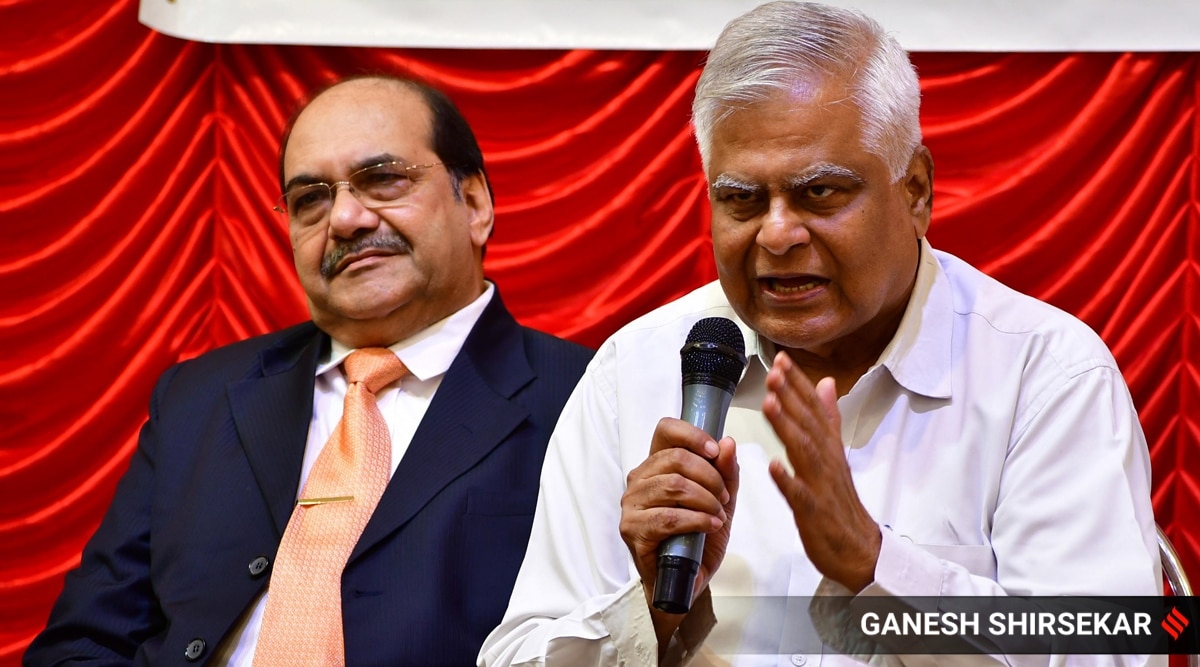 Justice UD Salvi (retired), along with Justice Abhay Thipsay (retired), addresses the media in Mumbai on Tuesday. (Express photo by Ganesh Shirsekar)
Justice UD Salvi (retired), along with Justice Abhay Thipsay (retired), addresses the media in Mumbai on Tuesday. (Express photo by Ganesh Shirsekar)THE “LAW must carry justice with it”, said Justice U D Salvi (retd) on Tuesday while responding to the point that the remission granted to 11 men convicted for the gang-rape of Bilkis Bano and the murder of her family members during the 2002 Gujarat riots was done as per law.
Justice Salvi also said that the convicts accepting felicitations from local leaders after their release showed that there likely was no reformation in them.
Eleven convicts were released last week after a Gujarat government panel approved their application for remission of their life sentence. Justice Salvi had presided over their trial and delivered his judgment in 2008, convicting the 11 men.
Addressing the media on Tuesday, Justice Salvi said the decision should be reconsidered and decided fairly based on all the facts before authorities. “When it is said that the decision for the early release was as per law, it means two things. It is more than merely about law. Law is a vehicle for justice. Ultimately, law must carry justice with it,” he said.
Subscriber Only Stories
He said that the implementation of punishment awarded by the court is the responsibility of the government, which also has to consider safeguards for the victim.
Referring to videos and photographs on social media where the convicts were seen being felicitated after their release, Justice Salvi said that was not correct.
“Punishment is not for revenge or retribution alone. It is to bring reform. How does one know if a person has reformed? If he himself says that he accepts what he had done was wrong. If that was considered in granting them release, it is understandable. But it does not seem so in this case. They (convicts) should not have accepted the honours on their release. They could have said we accept the remission but not the felicitation,” he said.
Justice Salvi also said that if their release was being made into an issue about Hindus, it was defaming Hindutva. “And if it is being said that they are innocent, they did not commit the crimes and hence they are being honoured, it is defaming the judiciary which gave the judgments convicting them,” he said.
He said the judgment in the case was part of his duty as a judge and he did not feel that he had done anything special. “I do feel happy that I presided over the judgment,” he said. Justice Salvi added that the 11 men were convicted and their punishment upheld by both the Bombay High Court and the Supreme Court.
“Here the question is, when a case has gone through such legal scrutiny, how should a government arrive at its decision for remission to those booked?”
Justice Salvi said the law had provisions for remission but guidelines have to be followed. “If it is not done, it can lead to injustice. In this case, I do not know on what basis the decision was taken. I am asked if my opinion was taken as a presiding officer who delivered the judgment, I would want to say that it was not,” he said.
He also said that since the case was probed by the CBI, it may have been required to take the central government’s opinion as well. Justice Salvi said he was not aware if this had been done and if it was, what the government’s response was. “While giving remission, it is essential for the government to consider the victim, the crime committed and the punishment given. I do not think that it was done as I heard that the rules of remission dating back to 1992 were followed and not the more recent 2014 ones as the latter did not allow the benefit of remission in such crimes,” Justice Salvi said, adding that the government was required to consider the change in policies.
Justice Abhay Thipsay (retd) said the case was transferred to Mumbai from Gujarat by the Supreme Court in 2004 for a fair trial and the decision to grant remission should also have been by the Maharashtra government, and not by the Gujarat government.